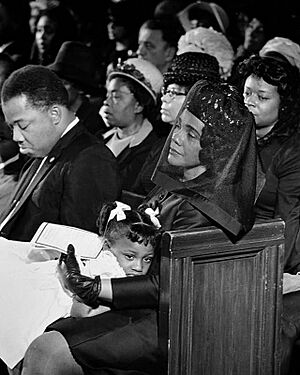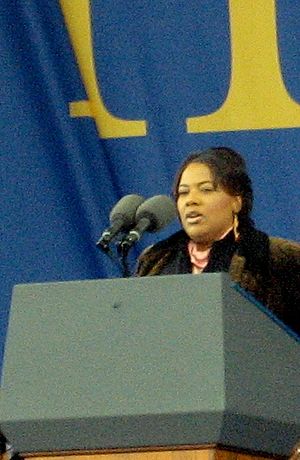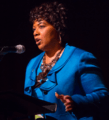Bernice King facts for kids
Quick facts for kids
Bernice King
|
|
|---|---|
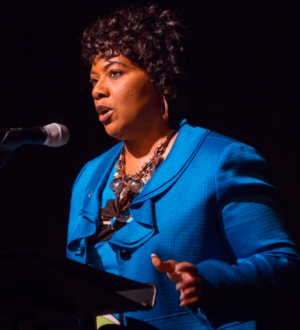
King in 2014
|
|
| Born |
Bernice Albertine King
March 28, 1963 |
| Education | Spelman College (BS) Emory University (MDiv, JD) |
| Occupation | CEO of The King Center |
| Parent(s) | Martin Luther King Jr. Coretta Scott King |
| Relatives | Alberta Williams King (grandmother) Martin Luther King Sr. (grandfather) Yolanda Denise King (sister) Martin III (brother) Dexter Scott King (brother) Alveda King (cousin) Edythe Scott Bagley (aunt) Christine King Farris (aunt) |
Bernice Albertine King, born on March 28, 1963, is an American lawyer and minister. She is the youngest child of famous civil rights leaders Martin Luther King Jr. and Coretta Scott King. Bernice was only five years old when her father was assassinated. As a teenager, she decided to become a minister, inspired by her parents' work. When she was 17, she was invited to speak at the United Nations (UN).
Her mother, Coretta Scott King, passed away in 2006. Bernice gave a speech at her funeral. After her sister Yolanda passed away in 2007, Bernice also spoke at her memorial. In 2008, Bernice supported Barack Obama's campaign for president. She said his nomination was part of her father's dream.
Bernice King was elected president of the Southern Christian Leadership Conference (SCLC) in 2009. Her older brother Martin III and her father had both held this position before. She was the first woman to be elected to lead the SCLC. However, she later decided not to take the role in January 2010.
Just a few months later, Bernice became the CEO of The King Center. Her main goal at the King Center is to share her father's ideas about nonviolence. She calls this "Nonviolence 365." She believes these ideas can help solve many of society's problems. Bernice also leads First Kingdom Management, a Christian consulting company.
Early Life and Family
Growing Up and Sad Times
Bernice Albertine King was born on March 28, 1963, in Atlanta, Georgia. Her father, Martin Luther King Jr., was very busy with the Civil Rights Movement. He often had to leave soon after she was born. A family friend, Harry Belafonte, even paid for a nurse to help her mother, Coretta, with their four children.
Bernice was only five years old when her father was assassinated. She has said she only has two clear memories of him: one at home with their family, and one of him in his casket at his funeral. She later understood more about his work.
After her husband's death, Coretta Scott King raised her four children as a single mother. Bernice feels this experience helped her understand families with only one parent. She has dedicated her life to helping young people who grew up without a father.
Bernice experienced other sad losses in her childhood. Her uncle, Alfred Daniel Williams King, passed away in 1969 when she was six. Five years later, her grandmother, Alberta Williams King, was shot and killed during a church service in 1974. Her cousin Darlene King passed away in 1976. Her grandfather, Martin Luther King Sr., also passed away in 1984. Bernice found strength through these difficult times.
Becoming a Minister
When Bernice was 16, she watched a documentary film about her father's life called Montgomery to Memphis. Seeing the film made her very emotional. She cried for a long time and started to understand her father's life and death more deeply. This experience helped her decide to become a minister, just like her father.
At 17, Bernice was invited to speak at the United Nations. She also felt a calling to become a minister that year. She attended Douglass High School in Atlanta.
Adult Life and Work
Early Activism and Education
At 19, Bernice gave her first big public speech in Chicago. She said, "We've come a long way. But we have a long way to go." Many people said she reminded them of her father.
Bernice graduated from Spelman College in Atlanta in 1985 with a degree in psychology. In 1985, she was arrested with her mother and brother Martin Luther King III. They were protesting against apartheid in South Africa outside an embassy. They stayed in jail overnight. In 1986, she was arrested again with her sister Yolanda and brother Martin III for protesting at a supermarket.
Bernice decided to become a minister at age 24. She earned two advanced degrees from Emory University in 1990.
Her Ministry and Public Role
On May 14, 1990, Bernice King became the second woman to be ordained at Ebenezer Baptist Church. She felt it was a very special moment.
In 1994, Bernice spoke out against New Hampshire not recognizing Martin Luther King, Jr. Day. She called it "racist." She also said parents should not let their children listen to "gangster rap" music. In 1996, she published a book of her speeches and sermons called Hard Questions, Heart Answers.
Bernice was an elder at New Birth Missionary Baptist Church. She left the church in May 2011. She said her decision was to focus more on her parents' legacy. She planned to start her own ministry.
In 2006, Bernice told teenagers at a conference that she wanted to continue her parents' work of nonviolence. In 2007, she started the Be A King Scholarship at Spelman College to honor her mother.
In 2014, Bernice and her brother Martin Luther King III joined the Governor of Georgia to sign a law for a statue of their father. She said statues help future generations remember. In the same year, her parents were given the Congressional Gold Medal after their deaths. Bernice said her family was "deeply honored."
Bernice also considered a career as a television anchor during college. She spoke out about the need for more African American teachers at her college. She interned at the Atlanta City Attorney's office.
On March 27, 1988, nearly 20 years after her father's death, Bernice gave her first sermon at Ebenezer Baptist Church. She said it was "affirming a call I received at 17." Many people, including Andrew Young, said her style was similar to her father's. Her mother, Coretta, was very proud and said they had become closer.
Leading The King Center
In 2008, Bernice and her brother Martin Luther King III had a disagreement with their brother Dexter about the management of the King Center. They settled the issue in 2009.
In January 2012, Bernice King was named CEO of The King Center. She met with the First Lady of Niger, Aïssata Issoufou Mahamadou, who admired her parents.
In 2013, Bernice spoke about the death of Evelyn G. Lowery, a civil rights leader. She also spoke about immigration, saying she disliked the terms "illegal aliens."
On her 51st birthday in 2014, The King Center hosted an event for girls and women. They showed a documentary called "Girls Rising." Bernice said it was to "educate, empower and inspire young women."
In August 2014, Bernice spoke about the shooting death of Michael Brown. She asked people to use nonviolent actions. She said the community of Ferguson, Missouri, needed help. She visited Ferguson and spoke to students, reminding them of her father's legacy.
Public Speaking Engagements
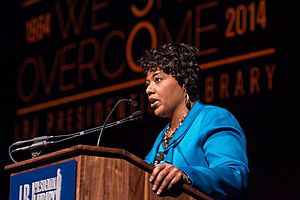
Bernice King is a frequent public speaker. In 1998, she was a main speaker at the Seminole County Prayer Breakfast. She was chosen to help bring people together.
In 2009, she appeared on CNN with her brother Martin III to discuss the inauguration of President Barack Obama.
On April 17, 2009, Bernice spoke at Liberty University. She told students they were "kings-in-training" and should embrace their identity.
On July 7, 2009, she spoke at a ceremony honoring the life of Michael Jackson in Los Angeles.
In 2011, Bernice spoke at the opening of the Martin Luther King, Jr. Memorial. She said it was a long-time goal for her mother. She also supported the Occupy Wall Street protests.
In 2012, after the shooting death of teenager Trayvon Martin, Bernice released a statement. She mentioned her father and grandmother, who also died from gun violence. She asked people to pray for Trayvon's family.
In 2013, she spoke on CNN about the verdict in the George Zimmerman trial. She said it would show "how much progress we've made." She was "heartbroken" by the verdict and called it a "wake-up call."
On August 28, 2013, the 50th anniversary of the March on Washington, Bernice spoke. She noted that challenges like violence still exist. But she was happy to see many young people and women at the event.
She spoke at a Boys & Girls Clubs fundraiser in 2013, encouraging involvement in children's lives. She also spoke about the passing of Nelson Mandela. On Martin Luther King, Jr. Day in 2014, she spoke at Ebenezer Baptist Church, asking if people were truly committed to the work that needed to be done.
In March 2014, Bernice gave a speech at Seminole State College of Florida. She focused on the 50th anniversary of the March on Washington and the Civil Rights Act of 1964.
Evolving Views on Equality
In 2004, Bernice King participated in a march in Atlanta. This was different from her mother, Coretta, and her older sister Yolanda, who were strong supporters of equal rights for all people.
However, by 2015, Bernice's views seemed to change. As CEO of The King Center, she released a statement supporting the United States Supreme Court's decision that made marriage equality legal across the United States. This showed her support for equal rights for everyone.
Family Losses and The King Center
Bernice's mother, Coretta Scott King, passed away on January 30, 2006. Bernice gave the eulogy at her funeral. She called her mother's death a "major turning point" and a "rebirth" for her. Bernice was the only one of her siblings with her mother when she passed away.
After her mother's passing, Bernice and her brother Martin Luther King III worked to protect The King Center. They wanted to keep it independent.
Sixteen months later, on May 15, 2007, Bernice's sister Yolanda King passed away. Bernice gave the eulogy at her sister's memorial. She said Yolanda's death was even harder than her mother's. She remembered her sister calling her "my one and only sister."
Southern Christian Leadership Conference Role
Bernice King has been active in helping to improve the Southern Christian Leadership Conference (SCLC). Her father and brother Martin III both led this group. On October 30, 2009, Bernice was elected president and CEO of the SCLC. She was the first woman to lead the organization.
However, there were disagreements within the SCLC. Bernice felt her suggestions to improve the group were being ignored. In January 2011, she decided not to take the presidency. She said she would continue to pray for the organization. In 2014, Bernice supported the idea of the 2016 Democratic National Convention being held in Birmingham, Alabama. She felt it would be special because of the city's civil rights history.
Honors and Awards
On December 14, 2007, Bernice King received the "Commitment to Community" award. This was from the Georgia Alliance of African American Attorneys. It honored her work as a lawyer and community leader.
On October 7, 2009, she received an award for her "lifetime of service to women and other causes." This was at the National Coalition of 100 Black Women Convention.
On November 7, 2013, Bernice received the Legend Award. This was part of an event celebrating the 50th anniversary of her father's "I Have a Dream" speech. She gave a speech and was honored for his legacy.
Ebony magazine once named her one of their Ten of Tomorrow future leaders in the black community.
Images for kids
See also
 In Spanish: Bernice King para niños
In Spanish: Bernice King para niños
 | Aaron Henry |
 | T. R. M. Howard |
 | Jesse Jackson |


